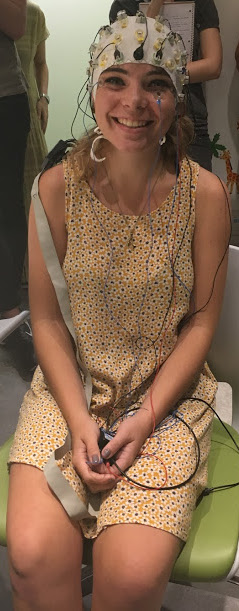Clinical, Cognitive, and Developmental Psychology PhD candidate Aislinn Sandre talks to In The Spotlight about the value of understanding individual susceptibility to develop depression and anxiety.

Research Area: Clinical Psychology; Cognition & Cognitive Neuroscience; Developmental Science
Faculty Supervisor: Dr. Anna Weinberg
Tell us a bit about yourself: I am from Oakville, a town in the GTA, and growing up, I never thought I was going to be a psychologist. Instead, looking back at my journals, I had dreams to become an author, painter, singer, doctor, and even a genetic counsellor! In a way, I got into psychology unintentionally. During the first year of my undergraduate degree at Queen’s University, I didn’t have to declare a major yet, so I enrolled in a bunch of different classes to see what would stick. I took an introduction to psychology class and was fascinated by the idea that psychological disorders and risk for these disorders could be measured at the level of the brain. For my honour’s thesis, I was matched to a year-long project where I measured the impact that childhood experiences of bullying could have on our brain, effects that increased the risk for developing depression. That year, anytime I did not have class, I was in the lab working on this project and too frequently diving into a google scholar hole trying to learn all that I could.
After undergrad, I took a year off to travel and work to see if research was in fact something I wanted to pursue. I obtained a research assistant job in emergency medicine in downtown Toronto. I saw hundreds of patients walk through the emergency department doors seeking mental health care and learned about how difficult it is for people to access treatment. After this experience, I knew that pursuing a career as a psychologist was what I needed to do — I could make discoveries in the lab that improved our understanding of mental disorders and be on the frontlines helping people who struggle with these problems. I applied to the Clinical Psychology PhD program at McGill because I knew that their high-quality training, along with Dr. Anna Weinberg’s mentorship, would allow me to achieve my career goal.
Tell us about your research in three sentences or less: My research aims to understand who is most susceptible to develop depression and anxiety, and how these disorders develop. To date, I have conducted studies examining whether exposure to early life stress, such as harsh parenting, abuse/neglect, or peer victimization, alters brain responses to rewards and threats, and whether these brain alterations make it more likely that people will develop depression and/or anxiety later in life, particularly when exposed to subsequent stressful events. In my work, I primarily use electroencephalography (EEG) to measure brain activity during sensitive periods of neurodevelopment, such as pregnancy, infancy, and adolescence.

What excites you most about your research? Depression and anxiety disorders affect millions of people worldwide. The number of people suffering from and the billions of dollars spent on treating these disorders are only expected to increase in the future. For these reasons, we need effective ways to prevent people from developing these disorders in the first place. My research is working towards this goal by identifying patterns of brain activity that may increase a young person’s vulnerability to develop depression and/or anxiety later in life. By identifying these neural vulnerabilities at an early age and before symptoms occur, my research may enable more timely and effective screening and prevention efforts.
Additionally, because EEG systems for recording brain activity are a cost-effective method that can be safety used with most populations, this method could be feasibly used to predict risk in clinical settings. This is what truly excites me about my research because it points to the possibility of clinicians screening people using biological measures, in coordination with self-report and behavioural data, to predict depression and anxiety risk and to better personalize intervention and treatment.
Is there any recent or upcoming work you’d like to tell us about? I am currently working on a project examining whether maternal stress and depression during pregnancy affects infant neurodevelopment in ways that increases the risk that these infants will develop depression later in life. These results may help us understand how risk for depression is transmitted from mother to child. This project involves conducting EEG with seven-month old infants, which can be challenging at times as babies move around a lot which can make brain activity recordings “noisy” or hard to read. Nonetheless, this project is incredibly rewarding — it reminds me to be grateful to all the families who see the value of psychology and are willing to dedicate their time to progressing the field so that hopefully their children will grow up in a world with a better understanding of mental health.
I will be presenting some exciting data from this project at the annual meetings for the Society for Psychophysiological Research and the International Society of Developmental Psychobiology in October.
My labmates are also working on several different ongoing projects, so if you’re interested in learning more, please visit the TRAC Lab website.
Do you have an interesting random fact or statistic that fascinates you? Baby fingernail clippings can be used to assess chronic stress exposure by measuring these samples for the stress hormone, cortisol.
What's your favourite thing to do outside of your research? I regularly do hot yoga and listen to podcasts. I also like dancing to live music and traveling to new places of the world with friends.


Do you have any advice for younger students in the Psychology Department? Finding that thing that excites you, that you are passionate about and want to work towards in terms of career, doesn’t always happen when and where we think it will. For these reasons, I think it is important to frequently pursue new and different opportunities that align with your interests, no matter where these opportunities may lead you. If you think research is something that you might be interested in, the best piece of advice I could give is to volunteer in a lab early in your degree and expose yourself to different labs and research. During and even after undergrad, I worked in several different labs studying topics including bird migration patterns, children’s language development, and acute delirium in patients with hip fractures. Working in these labs gave me an initial taste of what research is like day-to-day and narrowed down my interests. Also, in my experience, a diverse research background is an asset because you will be more likely to approach empirical questions from different angles using different tools or methods. This often leads to more interesting and meaningful findings!
How can people contact you? You can reach me by email at aislinn.sandre [at] mail.mcgill.ca and follow me on twitter at @AislinnSandre.